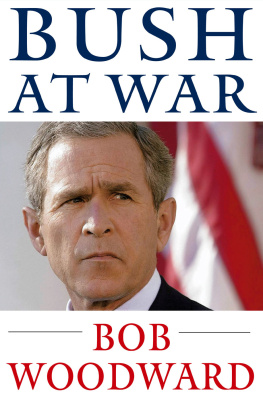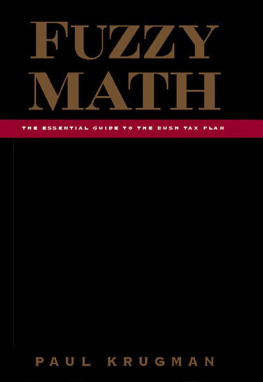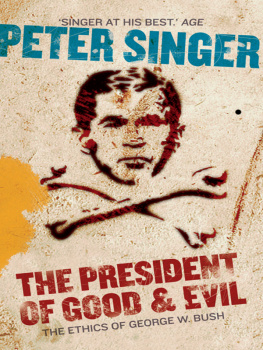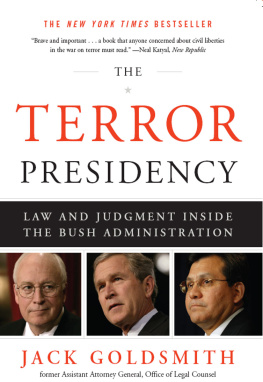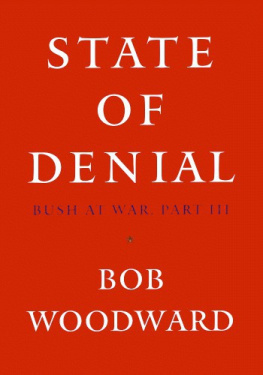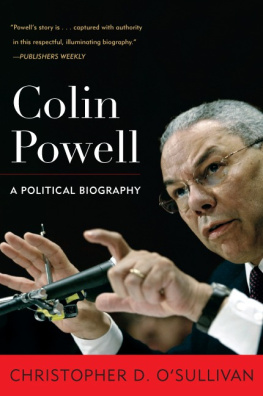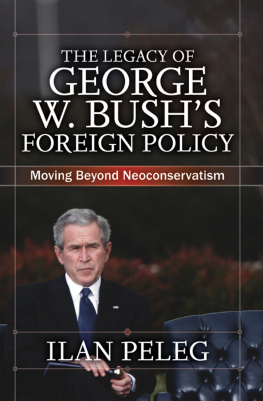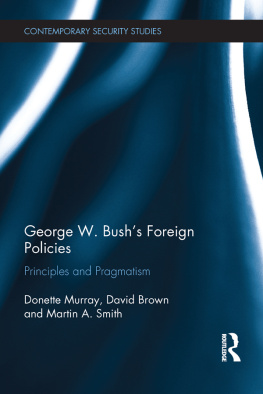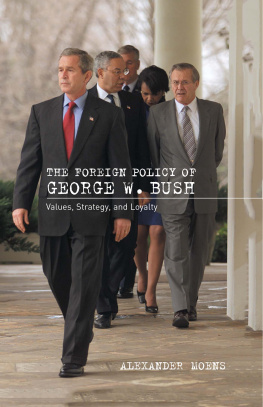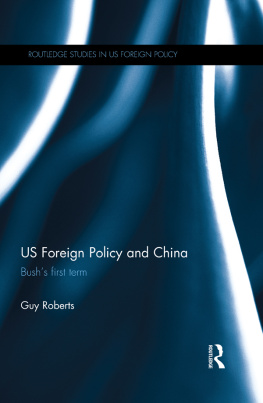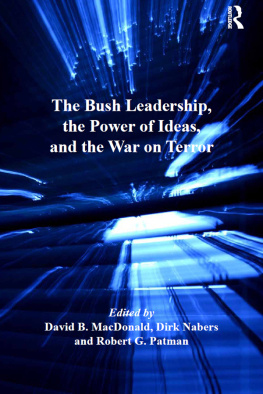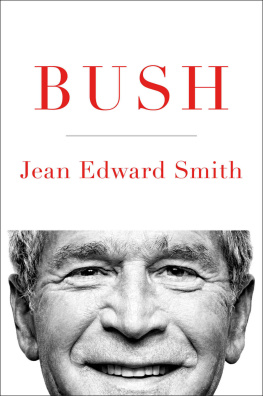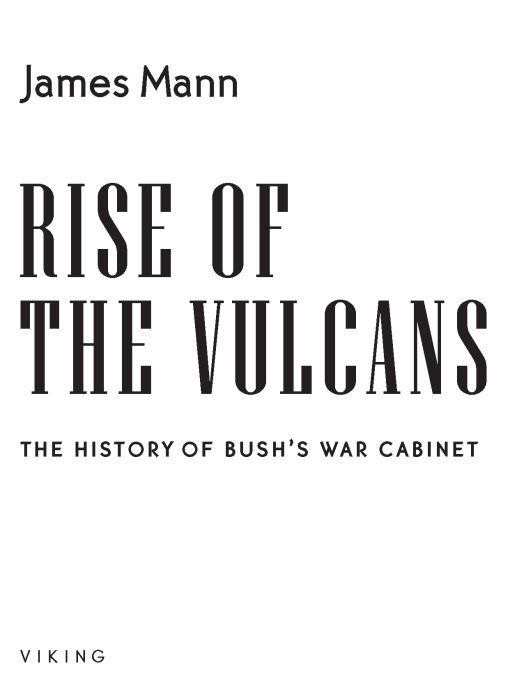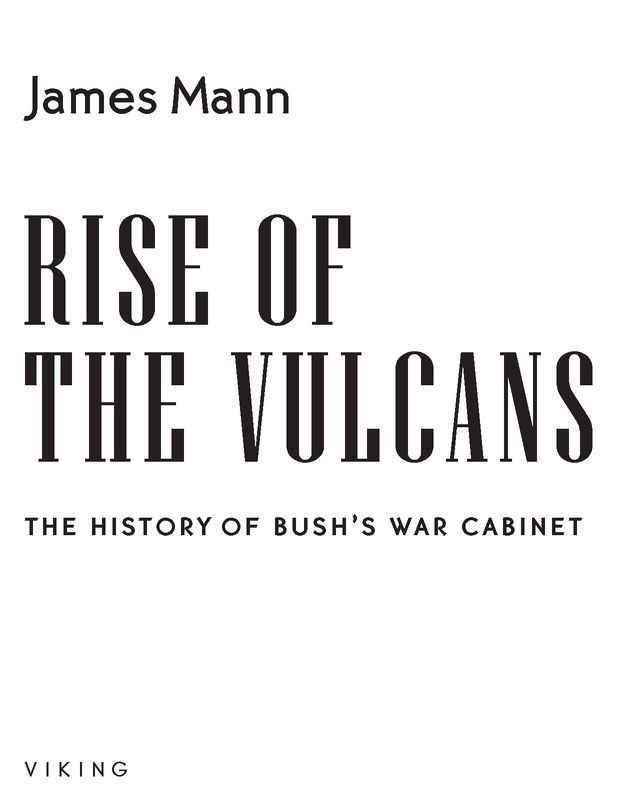Table of Contents
To my mother,
Peggy Mann,
who has inspired all of us
with the virtues of perseverance
and her love of life
Introduction
AS GEORGE W. BUSH campaigned for the presidency in 1999 and 2000, he gradually settled upon a consistent theme. Seeking to deflect questions about his lack of experience in foreign policy, he explained again and again that he possessed an eminent group of advisers, one with vastly more experience than the Democrats. Most of these advisers had already served at the highest levels of government during his fathers administration, in the heady days of the collapse of the Soviet Union and the first Gulf War against Iraq. Some of the advisers had served in the Reagan administration; some had even worked in the 1970s for Richard Nixon and Gerald Ford.
Whenever the younger Bush stumbled over detailsas he did, for example, when an ambush-style pop quiz by a television reporter demonstrated that he couldnt name the leaders of Pakistan or India He pointed to the men and women supporting him, such as his vice presidential nominee, Dick Cheney, Colin Powell, Condoleezza Rice, Paul Wolfowitz and Richard Armitage, as symbols of continuity and stability. This group of advisers became, for all practical purposes, Bushs principal foreign policy plank in his first race for the White House. His message was not so much what he would do as whom he would appoint.
During the campaign Bushs foreign policy advisers came up with a nickname to describe themselves. They dubbed their team the Vulcans, in honor of the Roman god of fire, the forge and metalwork. Rice, who was serving as foreign policy coordinator for the Bush campaign, had been raised in Birmingham, Alabama, where a mammoth fifty-six-foot statue of Vulcan on a hill overlooking downtown paid homage to the citys steel industry. The name had started as a joke, but it caught on, and the campaign group began to use it in public. That word, Vulcans, captured perfectly the image the Bush foreign policy team sought to convey, a sense of power, toughness, resilience and durability. (Ironically, Birminghams statue of Vulcan was taken down for repairs in 1999 because it was beginning to fall apart, a detail that the Bush team understandably did not emphasize when it began employing the metaphor.)
To no ones surprise, once Bush became president-elect, he turned to this same group of veterans to fill most of the top jobs. By the time the new administrations foreign policy team was assembled in early 2001, it had the feel of a class reunion. Most of its members had already worked closely alongside one another in previous administrations, and the ties among them were close, intricate and overlapping.
Donald Rumsfeld, the new defense secretary, had first worked alongside Cheney more than three decades earlier, when Cheney served as Rumsfelds administrative assistant in the Nixon administration. Cheney, as defense secretary in the first Bush administration, had selected Colin Powell (over several more senior generals) to be the chairman of the Joint Chiefs of Staff and had served with him for three years. Richard Armitage, the new deputy secretary of state, had worked with Powell when the two men helped run the Pentagon in the Reagan administration. Paul Wolfowitz, the new deputy secretary of defense in 2001, had collaborated closely with Armitage when the two men were responsible for Americas relations with Asia under Reagan. Wolfowitz had also served in the Pentagon as a top aide to Cheney. During the 1990s, when the Republicans were out of power, Wolfowitz had served on a prominent missile commission headed by Rumsfeld, and Armitage had run a small private consulting firm that employed Cheneys daughter.
By 2001 the Republicans had already controlled the White House for twenty of the previous thirty-two years. Their frequent successes in presidential politics had opened the way for ambitious Republicans such as the Vulcans to accumulate more years of on-the-job experience in foreign policy than their counterparts in the Democratic party. They had a long history, a collective memory. Even the two youngest members of the Bush foreign policy team of 2001the president himself and Rice, his national security adviserpossessed extraordinarily close ties to this legacy of the past. Bushs father of course had been president of the United States and before that had served as director of central intelligence and U.S. vice president. Rice had had the arduous task of coordinating policy toward the Soviet Union in the first Bush administration; she had been carefully groomed as a protge by Brent Scowcroft, the elder Bushs national security adviser.
The interconnecting relationships and the overhang of the past extended down through the ranks of the faithful. The aides and disciples of the top leaders had also toiled and advanced together through the series of past Republican administrations. Some of them shuffled back and forth from one boss to another. I. Lewis (Scooter) Libby, Vice President Cheneys new chief of staff, had been an undergraduate student of Wolfowitzs at Yale University three decades earlier and had served as an aide to Wolfowitz for more than a decade during the Reagan and first Bush administrations. Several members of Rices new National Security Council team had worked previously for Cheney, Wolfowitz or Armitage.
Because of this legacy, as the Republicans prepared to return to power in 2001, there were suggestions that Americas relations with the world were about to be restored to what they had been in the first Bush administration. During the same week, New York Times columnists Maureen Dowd and Thomas L. Friedman chose the same word, retreads, to describe the people surrounding Bush. George II was an obedient son who emulated his father, the old king, in all respects, wrote Dowd a few weeks later. He felt no need to put his own stamp on his monarchy.
Such perceptions extended well beyond the realm of newspaper columns. Overseas many foreign governments and scholars basked in a sense of security that a new Bush administration would follow largely along the lines of the previous one and that its policies would be predictable. Its veterans were thought to care about great power diplomacy, not moral crusades; about maintaining stability, not changing the world. The Republicans are generally better at foreign and security policy than the Democrats, observed Yang Jiemian of the Shanghai Institute for International Studies.
These predictions of restoration and continuity were soon shown to be wrong. From its first months in office the new Bush foreign policy team made clear that it would deal with the world in new ways. Its style was, from the outset, at variance with that of the first Bush administration. During the first nine months of 2001 the new administration adopted a more confrontational approach to dealing with North Korea and with China. It quickly pressed forward with plans to develop a missile defense system, despite the uneasiness of its European allies. It displayed a pronounced skepticism about the value of international agreements and treaties that it believed were not in the American interest.
The administrations distinctive approach to the world became considerably more pronounced after the terrorist attacks on the World Trade Center and the Pentagon on September 11, 2001. Over the following year the Vulcans put forth a remarkable series of new doctrines and ideas, ones that represented a dramatic break with the foreign policies and strategies of the past. In dealing with hostile powers, the Bush administration decided that the United States would no longer hold to the policies of containment and deterrence that had been the fundamental tenets of the cold war. Instead the United States would be willing to start a war through a preemptive attack. In the Middle East, where the United States had for decades worked closely with such authoritarian regimes as Saudi Arabia, the Bush administration broke precedent by openly espousing the cause of democracy and by talking about the political transformation of the entire region.


